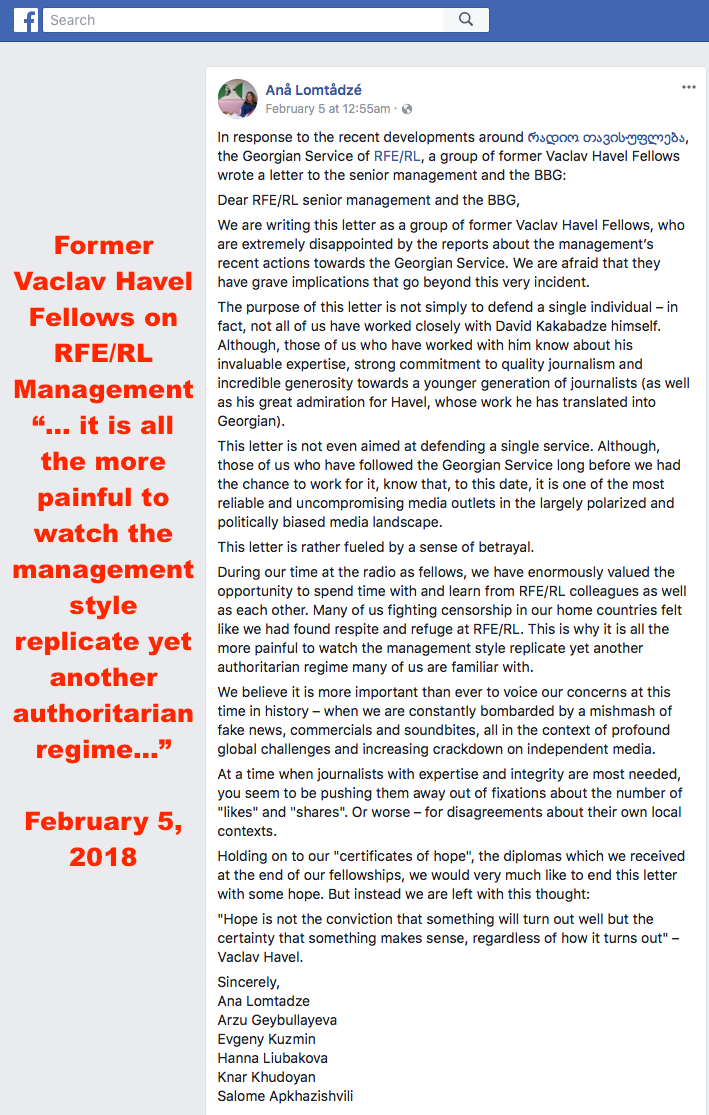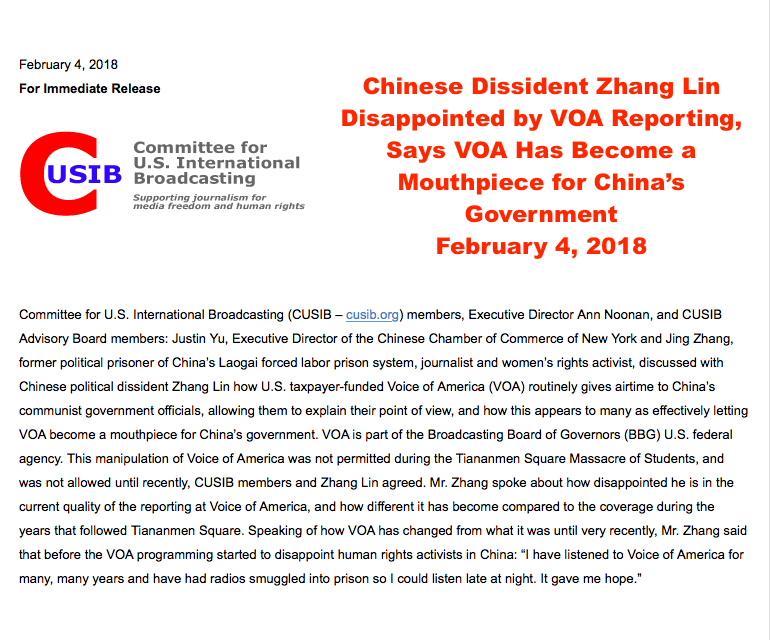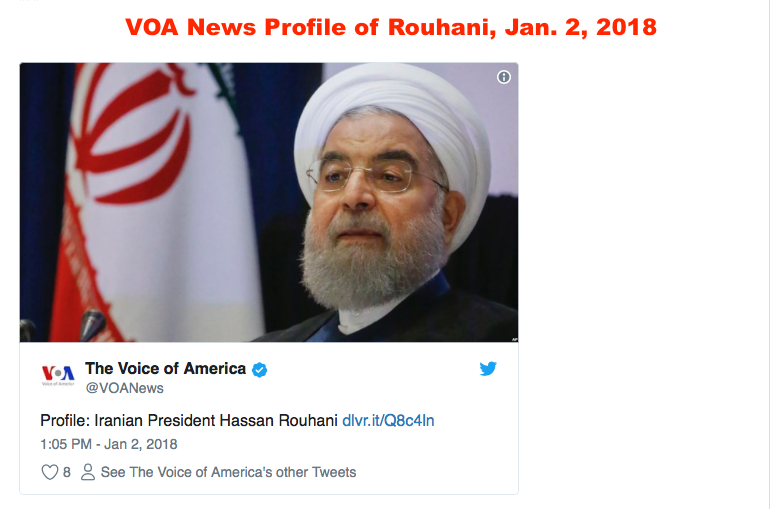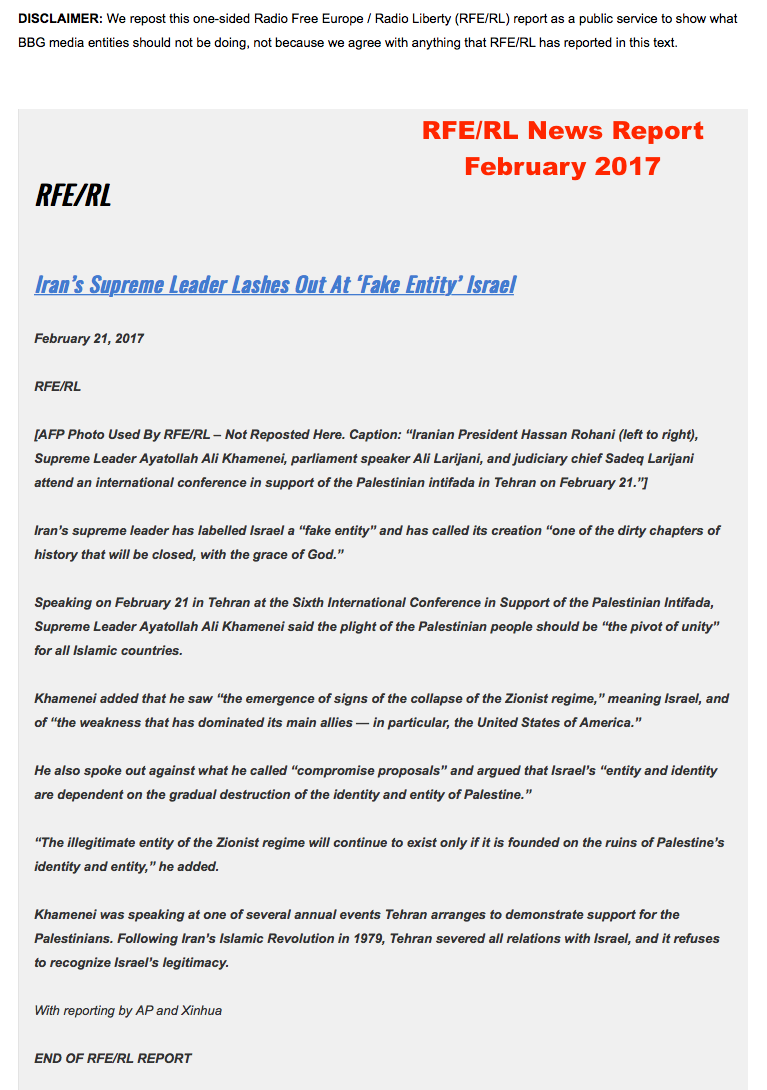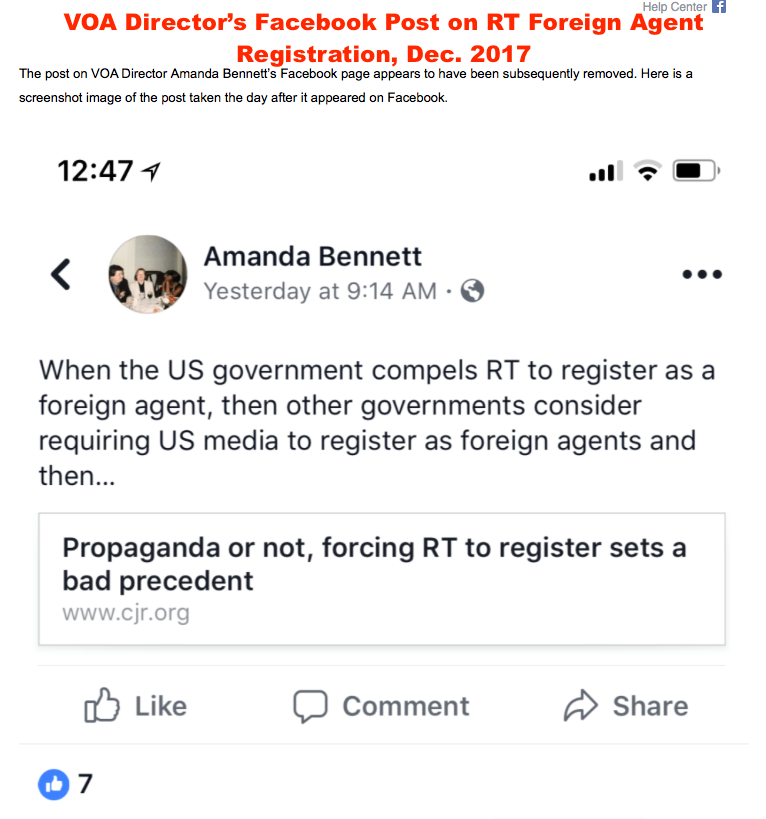BBG Watch Commentary
According to the announcement posted on the Broadcasting Board of Governors (BBG) website, the Broadcasting Board of Governors will meet on March 14, at 1:00 pm at its Washington, D.C., headquarters to review programming to Russia, China and the Middle East. According to the BBG announcement, the deadline for public comments for this meeting has passed, however, the public may attend the open portion of this meeting as seating allows, and there will be an opportunity for
public comment. Members of the public wishing to attend in person must register (via Eventbrite) by 12:00 PM on March 13.
Here are some of the comments based on input from BBG, Voice of America (VOA), and Radio Free Europe / Radio Liberty (RFE/RL) employee. They show an organization in a major managerial crisis in need of immediate reform.
A group of Voice of America Persian Service journalists has prepared a memorandum in which they decry what the employees see as a loss of VOA’s objectivity and mismanagement of human and capital resources by the service’s leadership, senior VOA executives and the top leaders of VOA’s parent federal agency, the Broadcasting Board of Governors.
In recent months, there has been a lot of negative coverage about VOA Persian, these VOA journalists wrote.
VOA PERSIAN SERVICE EMPLOYEES: We work here and we also believe there are systemic problems; now is the right time to act because Iran is on the verge of titanic changes that could affect U.S. national security interests in the Middle East for generations to come. We believe that the problems with VOA Persian can be categorized under two separate, though interconnected, themes. The first is the loss of objectivity which makes us less credible as a source of news, and prevents us from advancing America’s policy interests. The second problem is mismanagement of VOA Persian resources, including funds, talent, and programming. Unless these issues are addressed, the U.S. government cannot restore this news organization to its rightful place among Persian international news media. On February 12, Rand Corporation’s Alireza Nader made this observation in a panel discussion at the Atlantic Council: “The U.S. government should reform Voice of America to adopt a position that is more in line with U.S. interests regarding Iran. Voice of America used to be [a] very influential news program in Iran. It no longer is. It has lost its influence.”
Reza Pahlavi, the older son of the late Shah of Iran, warned in a video interview that U.S. taxpayer-funded media outlets broadcasting to Iran — Radio Farda operating within Radio Free Europe/Radio Liberty (RFE/RL) with headquarters in Prague and the Voice of America (VOA) in Washington, both managed by the Broadcasting Board of Governors (BBG) federal agency, help the regime to stay in power.
A U.S. federal government employee who works as a reporter for taxpayer-funded Voice of America (VOA) and collects a six-figure salary has reposted on a personal but public Facebook page a photo of North Korean communist leader Kim Jong-un showing his abundant black hair and a caption making fun of President Donald Trump. Unprofessional and biased behavior by some VOA journalists, which has not been addressed by top VOA and BBG leaders, can become a major national security liability during the upcoming U.S.-North Korea summit.
Khadija Ismayilova, a former political prisoner in Azerbaijan, an investigative reporter and winner of many international journalistic awards who recently quit RFE/RL, wrote in a public Facebook post that senior executives in charge of the organization suffer from “a crisis of career stagnation“ and don’t know how to communicate with journalists.
“People do not leave good organizations,” Ismayilova wrote in another public Facebook post. “I resigned from this organization because they didn’t hesitate to fire the best journalists,” she added.
Co-producer of award-winning HBO documentary on Syria and former anchor of RFE/RL-VOA Russian-language TV program “Current Time,” Shahida Tulaganova, who also quit RFE/RL, wrote in her January 25, 2018 Facebook post, RFE/RL management “kills journalism, incentive and values we do this job for.”
“Time to shake up this organization,” Shahida Tulaganova shared her views on Facebook about RFE/RL’s senior management.
Khadija Ismayilova, the recipient of the 2017 Magnitsky Award, the 2016 UNESCO/Guillermo Cano World Press Freedom Prize and the PEN American Center’s 2015 Barbara Goldsmith Freedom To Write Award, posted on Facebook: “I can’t understand why they are still naming me as their contributor in some stories, but I want to make it clear. I don’t work for RFE/RL anymore.”
After RFE/RL’s senior executives, Thomas Kent and Nenad Pejic, acting with apparent consent from Broadcasting Board of Governors CEO John F. Lansing, fired one of the organization’s most respected journalists Dr. David Kakabadze who until January 30 was director of RFE/RL’s Georgian Service, a group of six former RFE/RL Vaclav Havel Fellows — some of the best young journalists from East Central Europe and Eurasia who had worked at RFE/RL — wrote: “Many of us fighting censorship in our home countries felt like we had found respite and refuge at RFE/RL. This is why it is all the more painful to watch the management style to replicate yet another authoritarian regime many of us are familiar with.” Dr. Kabakadze was offered another position but declined the offer and chose to leave the organization.
One of the former young Vaclav Havel Fellows at RFE/RL, Arzu Geybullayeva, wrote in a public Facebook post: “The decision making process by the senior management often reminded me of some of the authoritarian countries where the Radio actually operates–the style of the leadership differed little.” She expressed her disappointment and frustration widely shared among RFE/RL employees.
Dr. Marina Vashakmadze, a well-known and highly respected journalist and media scholar in Georgia, has resigned as RFE/RL Bureau Chief in Tbilisi. She follows in the footsteps of other award-winning women journalists who also have resigned recently from RFE/RL in protest against the senior management, charging that executives use heavy-handed tactics and do not know how to communicate or motivate a staff of talented employees.
A group of some of the most prominent U.S. scholars specializing in China studies has sent a letter in defense of Voice of America Mandarin Service journalists who are being threatened with firing by VOA’s senior management over the April 19, 2017 live VOA interview with Chinese businessman whistleblower Guo Wengui which was cut short on orders of VOA director Amanda Bennett.
In defending her decision, Amanda Bennett stated that the live interview did not meet universally accepted journalistic standards.
In a letter addressed to Broadcasting Board of Governors Chairman Kenneth Weinstein and BBG CEO John F. Lansing, U.S. scholars wrote: “We the undersigned members of the China studies community in the United States are writing to express our deep concern about the recent proposed firing of three Chinese journalists by the Voice of America (VOA).”
Their letter states that they “have been watching and reading the work of these journalists and we believe that they are among the best in the Chinese journalistic community worldwide.” The U.S. scholars added: “We applaud their courage in conducting the interview despite what was reported to be great pressure from the Chinese government not to do so.”
The letter also says that “To fire three of the best journalists of VOA will only please the Chinese authority and aggravate the dismay of Americans like us who pay attention to U.S.-China relations.”
BBG, VOA, RFE/RL – Management Failures in Images – 2016-2018
These images from the U.S. taxpayer-funded Voice of America and Radio Free Europe/Radio Liberty websites, social media pages and from other sources in the period between 2016 and February 2018 illustrate various violations of the VOA Charter, journalistic bias, poor judgment and management failures under the overall oversight and control of the Broadcasting Board of Governors.










